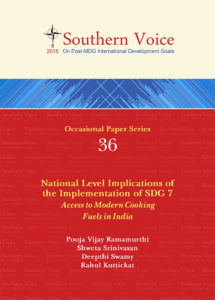 Sustainable Development Goal 7 (SDG 7) aims to “ensure access to affordable, reliable, sustainable and modern energy for all” by 2030. India is home to the world’s largest population without access to modern energy – 400 million people do not have access to electricity and 800 million people still cook with traditional biomass. In this context, this study analyses the potential to embed the SDG 7 target of universal access to clean fuels and technologies into India’s national agenda.
Sustainable Development Goal 7 (SDG 7) aims to “ensure access to affordable, reliable, sustainable and modern energy for all” by 2030. India is home to the world’s largest population without access to modern energy – 400 million people do not have access to electricity and 800 million people still cook with traditional biomass. In this context, this study analyses the potential to embed the SDG 7 target of universal access to clean fuels and technologies into India’s national agenda.
The analysis of the present paper shows that at the current pace of deployment of clean cooking technology, it seems unlikely that India will meet the SDG 7 target by 2030. In order to progress towards achieving this target, India needs to adopt a two-pronged technological approach – access to modern cooking fuel needs to be increased alongside efforts to make traditional cooking fuels safer to use. Consumer affordability, access and awareness all remain large barriers to the successful uptake of clean cooking technologies. There exists a lack of intra-governmental coordination, and existing networks are not effectively utilised. Non-governmental stakeholders have a key role to play in facilitating market finance, robust ‘last-mile’ distribution, community engagement, awareness-raising and after-sales services. Current data monitoring mechanisms also need to be modified so as to effectively track progress towards the SDG 7 target.
Authors: Pooja Vijay Ramamurthi, Shweta Srinivasan, Deepthi Swamy, Rahul Kuttickat

